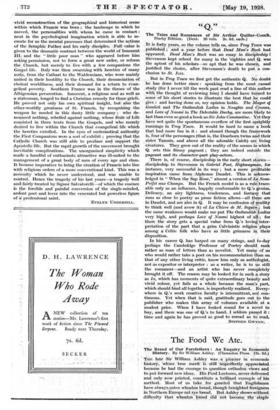The Tales and Romances of Sir Arthur Quiller-Couch. Duchy Edition.
(Dent. 30 vols. 3s. 6d. each.) IT is forty years, so the volume tells us, since Troy Town was published ; and a year befoie that Dead Man's Rock had appeared. Dead Man's Rock was an essay in discipleship .I Stevenson kept school for many in the 'eighties and Q. was the aptest of his scholars—so apt that he was chosen, and justified the choice, after Stevenson's death to put a con- clusion to St. Ives.
But in Troy Town we first get the authentic Q. No doubt he has done better since : speaking from the most_ casual study (for I never till the week past read a line of this author with, the thought of reviewing him) I should have turned to some of his short_ stories to illustrate the best that he could give : and having done so, my opinion holds. The Mayor of Gantick and The. Outlandish Ladies in Noughts and Crosses, and Love of Naomi in The Delectable Duchy, are more likely to last than even so good a book as Sir John Constantine. Yet they have not quite the spontaneous overflow of the first sprightly . runnings_ in Troy Town. It would be hard to name a book that had more fun in it : and absurd though the framework is,fOur of the personages (that is, the Dearborn twins and their . sister Tamsin, and above all the adorable Caleb) aril 'living creatures. They grow out of the reality of the scenes in which Q. sets this flimsy pageant ; they are indeed outside the pageant and -its character-part play-actors:— -
.There is, of course, discipleship in the early short siories-
discipleship to Stevenson in Gabriel Foot, Highwaynsun, for instance, very successful in its way ; but a more profitable inspiration came from :Alphonse Daudet. This is ticknow- ledged in " When the Sap Rose," almost a version of LX Sous- Preft aux Champs. But the French model is as a roleZtrace- able only as an influence, happily conformable to Q.'s ilenius. Delicacy, an airy lightness, tenderness, and fantask that runs as close to poetry as prose fiction allows—all these are in Daudet, and are also in Q. It may be confession of senility to think well (and avow it) of La Chevre de 31. Segfiin ; but the same weakness would make me put The Outlandish-Ladies very high, and perhaps Love of Naomi highest of -all; for there the story gets a special value from Q.'s loving" inter- pretation of the part that a grim Calvinistic religion;:plays among it" Celtic folk who haVe So little grimness in their disposition.
In his career Q. has harped on many strings, and to-day perhaps the Cambridge Professor of Poetry should, rank rather as man of letters than as novelist. Yet many of us who would rather take a poet on his recommendation than on that of any other living critic, know him only as anthologist, not as expositor or interpreter : as a writer, he is to us still the romancer—and an artist who has never completely brought it off. The reason may be looked for in such a story as Ia, which has moments of quite extraordinary beauty and vivid colour, yet fails as a whole because the man's part, which should bind all together, is imperfectly realized. - Every- where in Q.'s work creative faculty is intermittent, not con- tinuous. Yet when that is said, gratitude goes out to the publisher who makes this array of volumes available at a
Modest price. When I have looked round for a novel to buy, and there was one of Q.'s to hand, I seldom passed it : time and again he has proved as good to reread as toread. STEPHEN GWYNN.


































 Previous page
Previous page